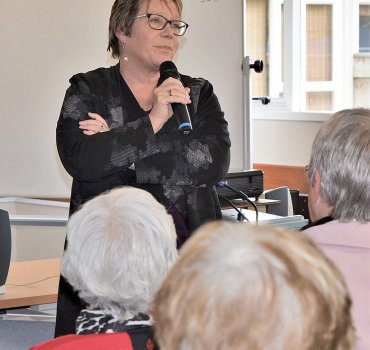

Minister for Seniors, Tracey Martin, speaking in Cambridge.
“Don’t let anyone tell you that you are a burden to New Zealand. If you went on strike tomorrow, this country would fall to its knees.”
That was the message delivered by Seniors Minister Tracey Martin to a packed Cambridge Grey Power meeting last week.
The gathering at the Taylor St Health and Community Centre attracted Grey Power members, some local body election candidates and members of the public. Many had come to hear Ms Martin speak on upgrades to the SuperGold Card, which she announced a day earlier in conjunction with Deputy Prime Minister Winston Peters.
The new Better Later Life strategy – He Oranga Kaumātua 2019-2034 – was launched earlier this year to replace the Positive Ageing Strategy which ran from 2001-2010.
“No-one did anything about the seniors’ community after 2010. I decided we didn’t want to revamp it, so asked New Zealanders what they wanted. The strongest thing to come through was that there was no such thing as retirement. Turning 65 means transitioning from paid work to unpaid work, from full-time to part time work, from a wage economy to superannuation.”
Referring to the current lobbying by broadcaster Mark Sainsbury for the appointment of an aged-care commissioner —and the pushback by TOP leader Geoff Simmons—she said the topic had raised talk of a universal basic income for all New Zealanders.
“They would need to lower superannuation across the board and transfer it to the younger generation if the country was to be able to afford that. The interesting thing is that they haven’t had a conversation about exactly how much seniors contribute to New Zealand.
“They don’t mention the $50 billion your spending will put back into the economy by 2036, the $25 billion you do in terms of voluntary work, or the $13 billion you will pay in taxes by 2036,” she said. “You only hear one side of the conversation from politicians when it comes to seniors.
“I sit on the Future of Work Standing Committee [a government-initiated tripartite forum established in mid- 2018]. By 2036, there will be one million New Zealanders aged 65 and over; the reality is, we cannot have one million New Zealanders drop out of the workforce, taking all that knowledge, expertise and skills with them. We need to make sure our seniors remain connected to the workplace.”
She said today’s seniors were fitter, more active and more ‘connected’ than the generations before.
“I am signing at least 20 cards a month for those turning 100. Japan has 80,000 citizens over the age of 100, so we need to keep our seniors connected to the workplace, whether it is paid work or voluntary. And we need to make sure businesses understand that.
“So, don’t let anyone tell you that you’re a burden to the country … because you’re not.”

Cambridge Grey Power president Val Massey with Seniors Minister Tracey Martin.
Super upgrade explained
An upgrade to the SuperGold Card was long overdue, Cambridge seniors have been told.
Addressing last week’s public meeting hosted by Cambridge Grey Power, Seniors Minister Tracey Martin said previous governments had invested ‘zero’ into the gold card over the past six years, leaving seniors confused over the benefits and battling to access information on participating businesses.
The changes also brought more posters and counter cards into circulation, making it easier for card-holders not using the website to know where they could access discounts.
An amount of $7.7 million invested in this year’s Budget for the revitalisation of the SuperGold Card would be of benefit not only to seniors, but also businesses she said.
“There are 750,000 seniors in New Zealand, there are going to be over a million by 2036. That is a lot of consumers who will choose to use participating businesses rather than go elsewhere.”
Deputy Prime Minister Winston Peters and Ms Martin announced the changes on October 1. They include an updated website, a new app which lists participating outlets at the touch of a finger, and the addition of 500 more businesses in just the three months officials were working on the new card. There are now 10,000 outlets nationwide through which seniors can get discounts.
Mr Peters said that since New Zealand First launched the initiative in August 2007, hundreds of thousands of New Zealander seniors had been able to stretch their dollar further.
Ms Martin said over half the country’s seniors had smart phones, and many others could become tech-savvy if given support. The upgraded website and phone app, which enabled users to identify participating stores at the touch of a button, would enhance the card’s benefits, particularly to the increasing number of seniors living on fixed incomes or living in rental properties.
She said the upgrades brought no physical changes to existing cards and did not call for further information to be provided by card-holders.








